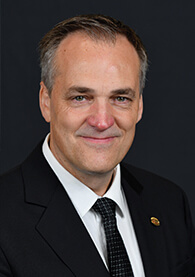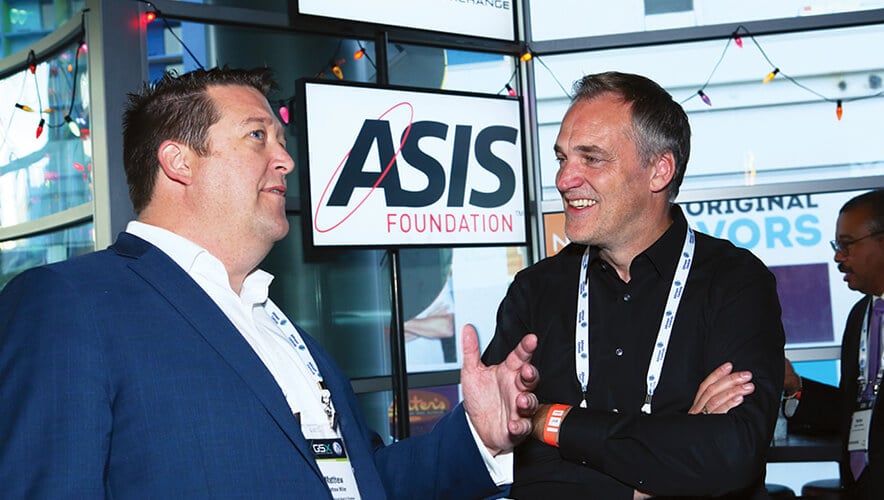Q&A: Godfried Hendriks, CPP, on the ASIS Global Community
 Incoming ASIS President Godfried Hendriks, CPP, spoke to Security Management about advice for new security professionals, education opportunities, and the unique community within the security industry—and the role ASIS plays moving forward.
Incoming ASIS President Godfried Hendriks, CPP, spoke to Security Management about advice for new security professionals, education opportunities, and the unique community within the security industry—and the role ASIS plays moving forward.
How did you get into the security profession?
A. As a petrol head in my youth, I was almost naturally drawn to study mechanical engineering and then try to find a job within my hobby. By coincidence, I got into security, mainly electronic security, video surveillance, all of these things. And in my first security job, one of the things we did was help reduce robberies and internal theft at retailers. Our customers like Shell and Exxon Mobil and other petrol retailers that at that time—the late 80s, early 90s—had a lot of problems with robbers, at least in The Netherlands. Meeting victims of robberies and hearing their stories and how the events influenced their lives made me determined to see how we could best help them in preventing those nasty robberies.
So I started studying criminology. I really became fascinated with how you can use the knowledge that criminologists find and combine that with available technology and innovation to secure and improve the lives of staff working at those kinds of sites.
(Hendriks now works as business and product development director, Europe, at Revolution Retail Systems, which automates and secures manual cash handling processes in retail organizations.)
Do you have any advice for new security professionals on how to gain that sort of knowledge and insight?
A. First, study business, because what we do is support business. I earned an MBA because I wanted to make sure that I was able to work with the folks at their headquarters—management or finance officials—and speak their language.
Secondly, you need to study the specific industry you’re in, because securing a telecom is completely different than securing a supply chain.
Number three would be to study security itself, in the broader sense of the word. In my personal opinion, the security piece of this equation is very achievable through ASIS educational and certification programming. Chapter meetings and scholarships, prep courses, and materials, as well as access to our global member network through ASIS Connects—all play a crucial role in supporting ASIS members continuously evolving their industry knowledge. Of course, we have a lot of technology, systems, standards, security risk assessments, and other important topics and domains to study.
And then, it is very important to know your opponents. In my case, it was very important to understand motivations, processes, and backgrounds of armed robbers, because some of them are motivated by money, others are motivated by power, or they rob as part of a sort of rite to become part of a criminal gang, for instance. Once you understand your opponents, it’s easier to prevent or diminish the results of their actions.
A key partner to education and security technology is good management—what sort of management skills do you think security professionals will need in the near future?
A. I think it’s very dependent on the continent, the country, and the local culture; what works in Western societies might not work in all societies.
What’s the best way to lead people? I’m personally a very strong supporter of servant leadership—helping your team be successful. But there are companies where you need completely different types of leadership.
Management style has to be tailored to the company and the audience, but also towards your personality. If you are a very strong leader who always wants to be in front of everyone and have the rest follow, you cannot suddenly change that into a servant leadership style where you try to push them from behind. It needs to fit with who you are.
Why do you volunteer some of your personal time with ASIS International?
A. I think volunteering at ASIS is kind of addictive. You start and then you meet people, and you make friends everywhere. It’s the meetings: at GSX, chapter meetings, or the annual volunteer leadership meeting. And then you really have that shared history and working on things together makes you friends, and it is so rewarding to work together to make the world a safer place.
How does having that global community help security professionals?
A. I very often get people who contact me because they know me, and they ask me for help in a certain country. They say: “My CEO is traveling to this country in Africa, and I need someone to tell me what I need to do there. Do you know someone there?” And then usually I know people like the regional vice president or chapter chair, so I can reach out and connect them with the folks who connect with me. And then they can help each other.
That’s very rewarding because it doesn’t give me anything except for the great feeling that I can help other people and knowing that support for anyone anywhere in the world is literally a phone call or email away.
Do you feel that the security industry is unique regarding its willingness to share information?
A. I speak to a lot of people from different industries, and very often they are highly competitive and not really willing to share, not really willing to help each other.
We as security professionals can all be in the same room because we have the same enemies—our enemies are the criminals—and we need to speak together to help each other fight crime. To me, the security industry, and especially the ASIS network, is unique for that.
What are some of your goals as the incoming president, particularly because you are leading the new ASIS Global Board of Directors?
A. The main thing we need to focus on in 2020 is the implementation of the global strategy. We have spent so much time and effort the past three years and under the great leadership of Thomas Langer, CPP; Dick Chase, CPP, PCI, PSP; and Christina Duffey, CPP, in shaping the future of the organization in all the different levels. But there’s so much more work to do to make that strategy a success. We will always be on the lookout for changes and where we need to adapt our strategy.
How is ASIS adding member value?
A. Whenever you need information or assistance, you can reach out to colleagues. I have so far never heard of someone unwilling to help someone else—even if they had never met, never heard of each other—just because they are both ASIS members.
Now we have ASIS Connects. You can basically ping a question or request help, and one of the 34,000 members will reply to you. In the last year, we had 7,000 posts and 2,000 new threads in ASIS Connects. So, I think that really makes visible how, in our ASIS community, everyone is able and willing to help each other.
Then there’s education—that starts with GSX and all the education there, all the articles in Security Management magazine and online, as well as regional conferences. Standards and guidelines are becoming more and more important for our industry. I think there’s just great work being done there.
How would you like to see ASIS evolve over the next few years?
A. I would like to see us attract the new generation. We need to attract more people to our industry—not just from security or law enforcement backgrounds, but also from different types of industries. We really need to make sure that security is considered a profession and that we have clear pathways for people starting in this profession. That’s something that we’re already strongly supporting on the mentoring side, where seasoned security professionals are willing to help new professionals find their way.
Also, convergence is no news to security professionals. If we listen to futurist Scott Klososky, who spoke at GSX and ASIS Europe in 2018, in a few more years, there is no physical security. There is no cybersecurity. It’s just security. And I think this is also a big challenge for us to make sure that ASIS is seen as the house of all security, not just physical security. And I think we’re already progressing on that with our ESRM approach very, very well.
If I compare some of our conferences and CSOs with cybersecurity conferences and CISOs, I often feel that we are one step ahead in understanding the way business operates and the way business thinks.
